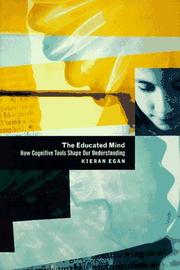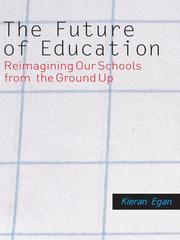| Listing 1 - 5 of 5 |
Sort by
|

ISBN: 9786612189210 1282189212 0226190404 9780226190402 0226190366 0226190390 Year: 1998 Publisher: Chicago
Abstract | Keywords | Export | Availability | Bookmark
 Loading...
Loading...Choose an application
- Reference Manager
- EndNote
- RefWorks (Direct export to RefWorks)
The Educated Mind offers a bold and revitalizing new vision for today's uncertain educational system. Kieran Egan reconceives education, taking into account how we learn. He proposes the use of particular "intellectual tools"-such as language or literacy-that shape how we make sense of the world. These mediating tools generate successive kinds of understanding: somatic, mythic, romantic, philosophical, and ironic. Egan's account concludes with practical proposals for how teaching and curriculum can be changed to reflect the way children learn. "A carefully argued and readable book. . . . Egan proposes a radical change of approach for the whole process of education. . . . There is much in this book to interest and excite those who discuss, research or deliver education."-Ann Fullick, New Scientist "A compelling vision for today's uncertain educational system."-Library Journal "Almost anyone involved at any level or in any part of the education system will find this a fascinating book to read."-Dr. Richard Fox, British Journal of Educational Psychology "A fascinating and provocative study of cultural and linguistic history, and of how various kinds of understanding that can be distinguished in that history are recapitulated in the developing minds of children."-Jonty Driver, New York Times Book Review
Education --- Cognition and culture. --- Civilization, Western --- Educational anthropology. --- Educational sociology. --- Learning, Psychology of. --- Teaching. --- Psycholinguistics. --- Language, Psychology of --- Language and languages --- Psychology of language --- Speech --- Linguistics --- Psychology --- Thought and thinking --- Didactics --- Instruction --- Pedagogy --- School teaching --- Schoolteaching --- Instructional systems --- Pedagogical content knowledge --- Training --- Learning --- Psychology of learning --- Educational psychology --- Comprehension --- Learning ability --- Education and sociology --- Social problems in education --- Society and education --- Sociology, Educational --- Sociology --- Campus cultures --- Culture and education --- Education and anthropology --- Anthropology --- Culture --- Culture and cognition --- Cognition --- Ethnophilosophy --- Ethnopsychology --- Socialization --- Philosophy. --- History. --- Psychological aspects --- Aims and objectives --- Philosophy --- education, language, literacy, learning, pedagogy, curriculum, understanding, cognition, anthropology, sociology, psycholinguistics, psychology, nonfiction, teaching methods, citizenship, knowledge, fulfillment, potential, individual growth, cognitive development, early childhood, elementary, secondary, imagination, science, math, grammar.

ISBN: 1282088483 9786612088483 0300142528 9780300142525 9781282088481 0300110464 9780300110463 6612088486 Year: 2008 Publisher: New Haven Yale University Press
Abstract | Keywords | Export | Availability | Bookmark
 Loading...
Loading...Choose an application
- Reference Manager
- EndNote
- RefWorks (Direct export to RefWorks)
Education --- Teaching. --- Learning. --- Philosophy.
Book
ISBN: 022624413X 9780226244136 Year: 2014 Publisher: Chicago University of Chicago Press
Abstract | Keywords | Export | Availability | Bookmark
 Loading...
Loading...Choose an application
- Reference Manager
- EndNote
- RefWorks (Direct export to RefWorks)
It is widely believed that a child's imagination ought to be stimulated and developed in education. Yet, few teachers understand what imagination is or how it lends itself to practical methods and techniques that can be used easily in classroom instruction. In this book, Kieran Egan-winner of the prestigious Grawemeyer Award for his work on imagination-takes up where his Teaching as Story Telling left off, offering practical help for teachers who want to engage, stimulate, and develop the imaginative and learning processes of children between the ages of eight to fifteen. This book is not about unusually imaginative students and teachers. Rather, it is about the typical student's imaginative life and how it can be stimulated in learning, how the average teacher can plan to achieve this aim, and how the curriculum can be structured to help achieve this aim. Slim and determinedly practical, this book contains a wealth of concrete examples of curriculum design and teaching techniques structured to appeal specifically to children in their middle school years.
Teaching. --- Imagination in children. --- Storytelling. --- Middle schools --- Middle school education --- Curricula. --- Activity programs. --- middle school, education, students, teachers, teaching, learning, imagination, imaginative, children, kids, grades, classroom instruction, story telling, engagement, development, preteens, teenagers, curriculum, curricula, memory, emotion, activity programs, humanities, social studies, educational, framework, affective, impact, influence, philosophy, freedom.
Book
ISBN: 0415820308 1135051054 020349850X 1135051062 9781135051068 9781299751934 1299751938 9780203498507 9781135051051 9780415820295 0415820294 9780415820301 Year: 2014 Publisher: New York London
Abstract | Keywords | Export | Availability | Bookmark
 Loading...
Loading...Choose an application
- Reference Manager
- EndNote
- RefWorks (Direct export to RefWorks)
For many children much of the time their experience in classrooms can be rather dull, and yet the world the school is supposed to initiate children into is full of wonder. This book offers a rich understanding of the nature and roles of wonder in general and provides multiple suggestions for to how to revive wonder in adults (teachers and curriculum makers) and how to keep it alive in children. Its aim is to show that adequate education needs to take seriously the task of evoking wonder about the content of the curriculum and to show how this can routinely be done in everyday classrooms. The a
Book
ISBN: 1443882488 9781443882484 9781443877367 1443877360 1443877360 Year: 2015 Publisher: Newcastle upon Tyne Cambridge Scholars Publishing
Abstract | Keywords | Export | Availability | Bookmark
 Loading...
Loading...Choose an application
- Reference Manager
- EndNote
- RefWorks (Direct export to RefWorks)
Imagination is the source of creativity and invention. This volume of essays has been collected expressly to bring readers new ideas about imagination and creativity in education that will both stimulate discussion and debate, and also contribute practical ideas for how to infuse daily classrooms with imaginative activities.Researchers and educators around the world have taken up the discussion about the importance of imagination and creativity in education. This global relevance is represented here by writings from authors from Brazil, Canada, China, Denmark, Italy, Israel, Japan, and Romania
| Listing 1 - 5 of 5 |
Sort by
|

 Search
Search Feedback
Feedback About UniCat
About UniCat  Help
Help News
News